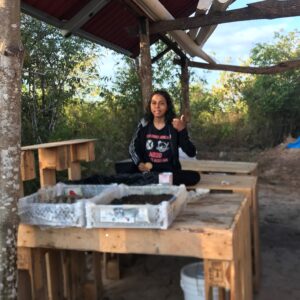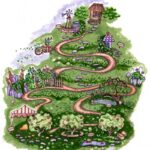Learning
Why learn Permaculture?
Permaculture helps us to live a balanced and sustainable life. Whether in a rural, suburban, or urban area, the principles, ethics, and design methods to which a practitioner of Permaculture adheres – or rather, since none of us are perfect, aspires to adhere – are the very principles, ethics, and methods that will greatly increase the possibility for a sustainable, regenerative human presence in harmony with all life on this planet.
 This PDC, facilitated at a forming ecovillage in the tropics, is, at its core, about relearning a mindset that humankind has lost over time, a mindset of abundance and cooperation not just with other human beings but with all life on earth. The primary steward of your learning experience is Rebecca Reiber, founder of 8th Life Panama EcoVillage project. Rebecca has over 30 years of practical experience in building teams, facilitating change, and creating and implementing Permaculture designs in a variety of settings. She is joined by experienced co-facilitators during each PDC — see the Faciltitors tab.
This PDC, facilitated at a forming ecovillage in the tropics, is, at its core, about relearning a mindset that humankind has lost over time, a mindset of abundance and cooperation not just with other human beings but with all life on earth. The primary steward of your learning experience is Rebecca Reiber, founder of 8th Life Panama EcoVillage project. Rebecca has over 30 years of practical experience in building teams, facilitating change, and creating and implementing Permaculture designs in a variety of settings. She is joined by experienced co-facilitators during each PDC — see the Faciltitors tab.
Learn by doing!
To increase learning opportunities and keep “classroom time” to a minimum while on site, there are 4 preparatory online classes held in the weeks prior to the onsite course. This maximizes practical hands-on experience and allows for meaningful discussion and action-learning. The course includes 13 full days of onsite learning including over 90 hours of practice, instruction, discussion, and skill sharing.
This course will challenge you to learn by doing and, when you’re ready, to enhance your learning by coaching others on what you’ve just learned. We all bring many skills to the table and we each have special gifts and talents and we will also challenge you to apply and adapt these throughout the course. Activities will center around the ever-changing panorama of a forming ecovillage in the tropics.
Required Prep Work
2 weeks prior to the course
4 virtual 2.5-hour sessions covering the following topics.
- What is Permaculture. Permaculture Ethics and Principles.
- Permaculture Design.
- Resource use, Energy, and Alternative Technologies
- Community, Invisible Structures, and Social Permaculture
These concepts will be reviewed and reinforced throughout the course. Holding the online sessions for these more theoretical aspects of Permaculture allows us to focus on putting ideas into practice while onsite.
Course Curriculum
- What’s going on in the world
- Permaculture – definition, ethics and principles
- Permaculture design and design methods
- Permaculture zones & sectors
- Soil
- Plants & trees
- Water & earthworks
- Animals
- Growing your own food
- The built environment
- Energy & resource use
- Waste
- Appropriate technology
- Landscape design
- Social design
- Community & ecovillages
- Invisible structures
- Designing your life
This is THE ONLY Permaculture Design Certificate course in Panama, and it’s held on the country’s only Permaculture-based EcoVillage.
August 17 – 31, 2024 – Apply now!
Facilitators: José Pablo Fernandez and Rebecca Reiber.
Online classes begin August 2. Earlybird price good until June 15, 2024.
$1,175 Regular Price — $975 Early Bird Price — $600 Panamanians & Ticos
Local University Students – contact us
What you get:
- 4 online classes held prior to arriving on site
- 14 days of onsite learning including field trips
- Over 90 hours of practice, instruction, discussion, and skill sharing
- Rustic lodging (shared rooms, tents)
- 3 healthy meals per day
- 1 free day to explore nearby towns, mountains and beaches
- One-on-one design support
- Lifetime involvement – come back any time.
-
A new appreciation of the world, of what is possible, and how to make changes that benefit the planet and all that depends on her.
Children are welcome for $100 per child to cover food and are welcome to listen and participate in anything they’re interested in. Of course, you’ll need to look after your child, but many participants will also help out.

Regular price: 50% is required to reserve your spot. The other 50% is due at latest 3 weeks prior to the course date. Earlybird price: payment is due in full at time of application.
Course Steward – Rebecca Reiber
Reb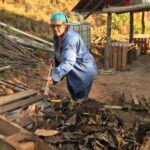 ecca left a career in international business to become a facilitator of change. She has worked in community development, forming and training diverse multicultural teams, and facilitating personal and professional development for 35+ years. A certified Permaculture Designer, Rebecca’s mission is to demonstrate that we can live sustainably on this planet. That’s why she’s founding the 8th Life Panama EcoVillage Project, where this PDC is being held.
ecca left a career in international business to become a facilitator of change. She has worked in community development, forming and training diverse multicultural teams, and facilitating personal and professional development for 35+ years. A certified Permaculture Designer, Rebecca’s mission is to demonstrate that we can live sustainably on this planet. That’s why she’s founding the 8th Life Panama EcoVillage Project, where this PDC is being held.
Co-facilitators vary depending upon their availability. Here are some of the people we often work with. We’ll introduce facilitators for each course as the time comes.
José Pablo Fernández
José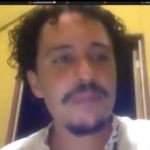 Pablo is a Permaculture designer, environmental educator and artist with over 15 years’ experience designing and teaching Permaculture throughout Central & South America. His journey started as a nature guide learning about the wildlife of the rainforest and the cycles and dynamics of nature. Jose Pablo is trained in organic and regenerative agriculture, forest gardening, ecosystem regeneration, ecological landscape design, sociocracy and sustainable eco-communities.
Pablo is a Permaculture designer, environmental educator and artist with over 15 years’ experience designing and teaching Permaculture throughout Central & South America. His journey started as a nature guide learning about the wildlife of the rainforest and the cycles and dynamics of nature. Jose Pablo is trained in organic and regenerative agriculture, forest gardening, ecosystem regeneration, ecological landscape design, sociocracy and sustainable eco-communities.
David Ahlgren
David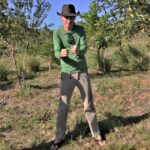 has worked on the regenerative design of over 44,000 acres of land which he continues to oversee. He is a PRI certified Permaculture Designer and restoration ecologist experienced in ecosystem design and implementation and in designing and installing alternative energy systems. He is active in sustainable plant and animal production and specializes in creating earthworks that restore ecosystems.
has worked on the regenerative design of over 44,000 acres of land which he continues to oversee. He is a PRI certified Permaculture Designer and restoration ecologist experienced in ecosystem design and implementation and in designing and installing alternative energy systems. He is active in sustainable plant and animal production and specializes in creating earthworks that restore ecosystems.
John Douglas
Guest Facilita tor, AKA Don Perezoso, former owner of the Lazy Man’s Farm & Peace Corps Volunteer, John now tends to his permaculture garden where he teaches anyone and everyone about the benefits of growing your own food, natural fertilizers and pest control, compost, and much more.
tor, AKA Don Perezoso, former owner of the Lazy Man’s Farm & Peace Corps Volunteer, John now tends to his permaculture garden where he teaches anyone and everyone about the benefits of growing your own food, natural fertilizers and pest control, compost, and much more.
Space is limited and spots will be filled on a first-come basis.
Here’s the application process:
- Fill out the application form.
- Once we receive your application, we’ll contact you for a video call. If you don’t hear from us within 2-3 days, please send us an email reminder.
- After the call, if we’ve mutually decided this course is for you, we’ll send you the course agreement.
- You sign and return the agreement and send us a copy of your payment through PayPal (friends and family to avoid large fees).
- When payment arrives, we’ll send instructions for getting here and any other course information you need.
* Regular price: 50% is required to reserve your spot. The other 50% is due at latest 3 weeks prior to the course date. Earlybird price: payment in full at time of application. Everyone: If you cancel more than 4 weeks prior to the course date, your deposit will be refunded (less processing fees) or it can be applied to a future course. If you cancel after making full payment up to 3 weeks prior to the course date, we will refund 80% of received funds (less processing fees). If we cancel or postpone for any reason, you have the option of receiving a full refund of funds received or of applying your payment to a future course.
Stay tuned … we’ll be adding information here to help you best prepare for this hands-on Permaculture learning experience.

